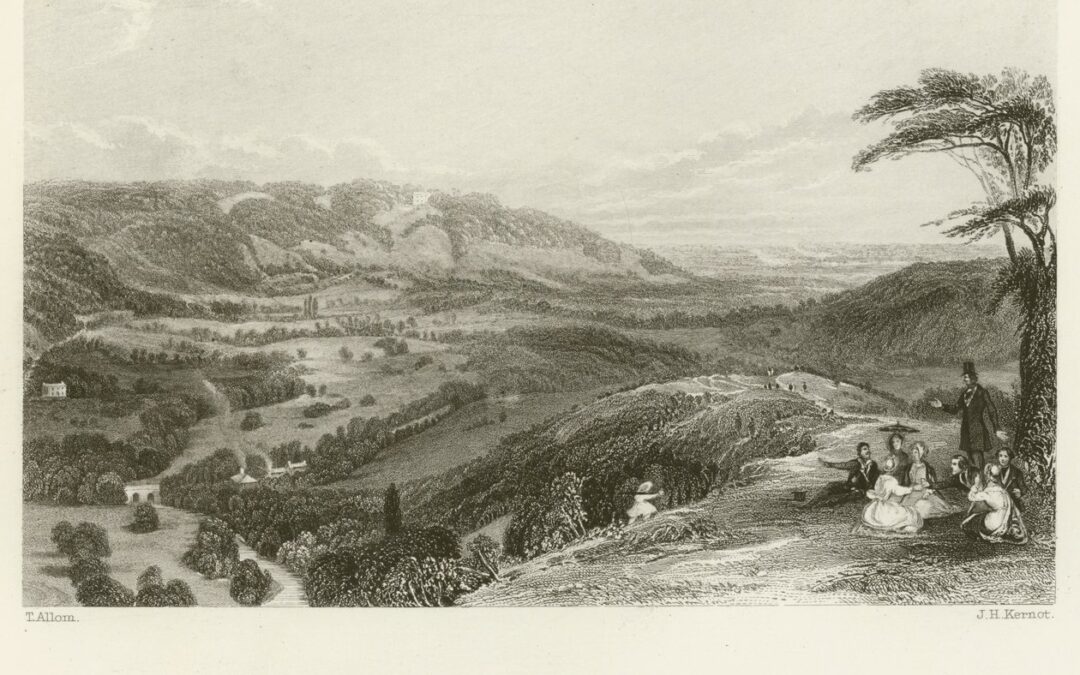Austen’s Emma has two picnic episodes, one of which never happens * and the other a proper picnic at Box Hill. During strawberry season, Emma Woodhouse and her crowd gather in Knightley’s Donwell Abbey garden. Mrs. Elston’s enthusiastic plan for a “pic-nic parade” is cutesy. Addressing Knightley, she says,
“It is to be a morning scheme, you know, Knightley; quite a simple thing. I shall wear a large bonnet, and bring one of my little baskets hanging on my arm. Here — probably this basket with a pink ribbon. Nothing can be more simple, you see. And Jane will have such another. There is to be no form or parade — a sort of gypsy party. — We are to walk about your gardens, and gather the strawberries ourselves, and sit under trees: — and whatever else you may like to provide, it is to be al out of doors by a table spread in the shade, you know. Everything as natural and simple as possible. Is not that your idea?”
Knightley replies, “Not quite.” He’s a stickler for formality and firmly says, “The nature and simplicity of gentlemen and ladies, with their servants and furniture, I think is best observed by meals within doors. When you are tired of eating strawberries in the garden, there shall be cold meat in the house.” He serves a “cold meat in the house.”
The picnic is unintentionally a parade as Emma, Knightley, Mr. and Mrs. Elton, Harriet Smith, Mr. Weston, Frank Churchill, Miss Bates, and Jane Fairfax are seated in two carriages for the twelve-mile drive from Highbury to Box Hill. Emma is in high spirits. She’s never been to Box Hill. Knightley is his usual dour self.
After admiring the “fine prospects” over the valley, the group is served the picnic meal, presumably by ever-present but invisible staff. It’s unclear if they sit on rugs, cushions, or chairs at tables. The meal is a “cold collation,” the substance that is not given. Presumably, there are wines, coffee, tea, or other beverages. But Austen is reticent about the details of what is served. 
Frank Churchill announces that Emma desires to know what you are all thinking of to break the boredom. This does not get the right response, so Churchill proposes that each say something. When Miss Bates says that she is sure to say three dull things, Emma cannot resist, and she says sweetly but sarcastically, “Ah! Ma’am, but there may be a difficulty. Pardon me — but you will be limited as to number — only three at once.” Miss Bates is insulted, and Knightley reproaches Emma for having behaved poorly toward a woman who is not her equal. Emma is stung, and the picnic ends with a thud, but she does not apologize.
The major film versions of Emma vie for distinction, sometimes dubious but confusing in the aggregate. The picnic is important in Emma, but because Austen’s details are described in a general way, the episode has been subjected to broad variations, especially Michael Barry’s 1948 Emma, which omits the Box Hill picnic.
*1972. John Glenister’s Jane Austen’s Emma Screenplay by Denis Constanduros. Emma (Doran Godwin), Knightley (John Carson). Glenister’s picnickers walk up the hillside where a cloth is spread. Only Knightley and Elton sit on a cloth, and Emma and the rest sit on the grass. The only food is a basket of strawberries.
*1996. Diarmuid Lawrence’s Emma. Screenplay by Andrew Davies,. Kate Beckinsdale as Emma and Mark Strong as Knightley
*1996. Douglas McGrath’s Emma. Screenplay by Douglas McGrath. Gwyneth Paltrow as Emma and Jeremy Northam as George Knightley
*2009. Jim O’Hanlon’s Emma. Screenplay by Sandy Welch. Romola Garai as Emma and Johnny Lee Miller and George Knightley
*2020. Autumn de Wilde, Screenplay by Eleanor Catton. Anya Taylor-Joy as Emma and Johnny Flynn as Knightley
Featured Image: Thomas Allom. View From Box Hill, Looking Towards Norbury. Engraved by James Harfield Kernot (1844) for A History of Surrey.
See Linda Troost and Sayre Green. Jane Austen in Hollywood Lexington, Kentucky: University of Kentucky Press, 2000; Sue Parill. Jane Austen on Film and Television: A Critical Study of the Adaptations. Jefferson, North Carolina: McFarland, 2002; The Jane Austen Cookbook, Recipes by Maggie Black and Introduction by Deidre Le Faye (London, 1995).

